- VMI
- automation
- AI
- ML
- Harm Voortman
- MILEXX
- electric vehicles
- truck
- Mike Norman
- Vision Systems
- automation
- smart software
VMI And India: A Long-Term Commitment: The importance of VMI’s new India base
- By TT News
- January 03, 2025

VMI’s CEO Harm Voortman was among the senior figures to celebrate the global smart manufacturing technology company’s new Indian engineering and service centre, which opened in Vadodara on 4th October. He gave a positive view on prospects for the Indian tyre market: “India is now among the top five global economies,” he said. “Prospects for the tyre market are exceptionally strong. Vadodara was the natural choice for our new engineering centre, which is now part of our global strategy for customer support, software engineering and long-term growth.”
VMI has been operating in India for years, but the new centre marks a step change for the company’s investment in the region. So what does VMI’s new strategy mean for the Indian tyre and automotive industry?
Helping to drive economic growth
India is the world’s fifth largest economy, and a key driver for growth is large-scale investment in road and transport infrastructure. There is growing demand for tyres, especially for trucks, with higher performance standards a must. Infrastructure investment will have a positive impact on the Indian economy, helping make India an even stronger global economic hub.
As we reported in July, VMI’s unique MILEXX automated truck tyre building machine is playing a major role in transforming access to the high-quality truck tyres the logistics industry needs inside India. With more and more Indian citizens also moving to electric vehicles, the need for improvement in quality and performance for car tyres is also clear.
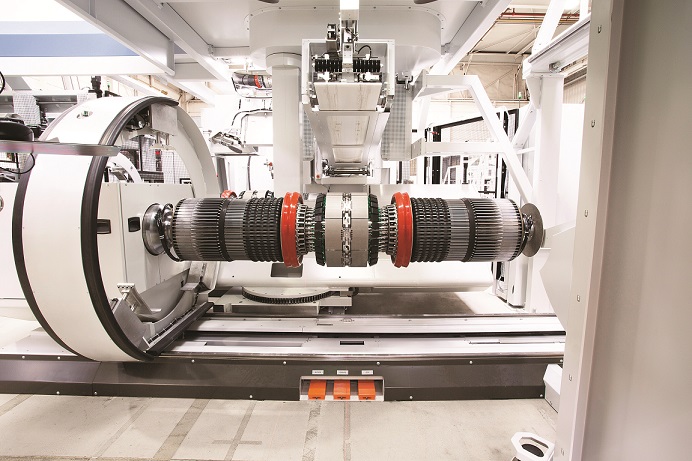
Mike Norman, VMI’s Chief Commercial Officer, said, “We expect to see growth in production accelerate over the next five years – and that goes a long way to explaining why VMI has chosen this moment for major new investment in the Indian market.”
Global software engineering
Perhaps the most compelling reason for VMI’s Vadodara investment is the drive to create an integrated, international software engineering capability for the entire business. India is the world’s most important centre for software capabilities: with home-grown businesses becoming household names and foreign companies building their own Indian research and engineering centres, tapping into the outstanding engineering capabilities India provides.
Automation is the key distinguishing feature of VMI production platforms. From the launch of the MAXX TBM 15 years ago, the concept of ‘hands-off, eyes-off’ has dominated VMI’s design thinking. Stage by stage, new concepts, components and functionalities have been introduced to VMI machines, aiming to reduce human contact and deliver error-free, higher quality, maximum efficiency production.
Vision systems were introduced a decade ago to carry out such key tasks as centring materials correctly, making the right cuts and ensuring consistent quality in output. As improved camera and software options become available, VMI introduces them as standard components to new machines and offers retrofitting to the installed base, enabling customers to operate at best practice level always.
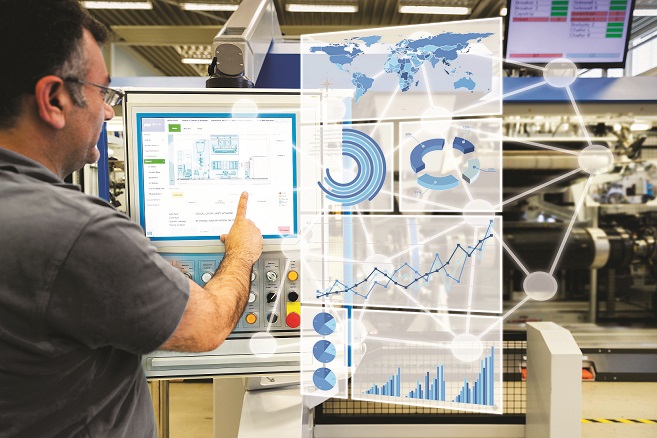
Artificial intelligence and machine learning (AI & ML) are now increasingly vital for VMI production platforms, which drives the need for software engineering capabilities of the highest quality. VMI has developed systems that use AI to identify anomalies (foreign bodies and faults in materials), enabling these issues to be dealt with at once, rather than causing scrap later. The same capabilities will soon be deployed to optimise production.
Smart software is the key to these emerging trends. As demand for new AI-related capabilities accelerates, VMI is building the high functioning, global software engineering team it needs to prosper in this emerging world. By creating an attractive, well-managed centre in Vadodara, VMI expects to mobilise some of the most qualified, ambitious and visionary engineers India can offer. The team is truly global in nature, using a common engineering platform to enable cross-border collaboration and deliver real benefits both to VMI and the Indian economy.
Why is software so important?
Most commentators believe the industry is at an inflection point, where the current business model is changing fast. We see a growing need for many more tyre variants (SKUs), caused by such factors as the move to EVs, need for lighter but stronger and more flexible tyres, introduction of more environmentally responsible new materials (due to lower levels of particulate pollution) and different patterns of demand in the market.
As Norman commented, “The industry is being challenged to move to a different model, with greater production flexibility, less waste and scrap, lower energy costs and reduced emissions.” That means greater process agility and even higher levels of automation. We will need to develop autonomous decision making (requiring AI & ML), near elimination of errors and scrap (better automation of all processes) and the ability to switch from one SKU to another, with short production runs that are still profitable.
None of these changes can happen without intelligent software. Norman added, “The Vadodara investment gives VMI the scale and skills to become the industry leader in flexible AI-enabled systems – with India at its heart.”
Service transformation
The Vadodara centre also means VMI now has a global network of service centres to provide 24/7 ‘follow the sun’ support to customers worldwide. Vadodara is a key part of VMI’s ‘Global but Local’ service approach, covering everything from maintenance, parts and troubleshooting, through to optimisation consulting and training, retrofits and upgrades and remote monitoring to ensure optimal operation.
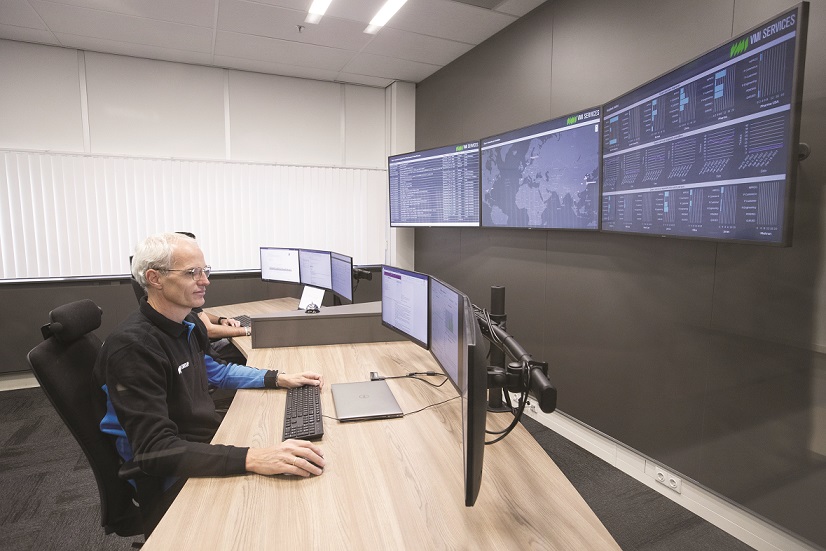
The Global but Local concept means customers are always served by teams that speak their language and share their culture but operate to consistent, best-practice standards – everywhere. All VMI’s service engineers use the same tools and methods, covering service desk, innovation, core R&D, order engineering retrofits and upgrades.
The Vadodara centre builds on and extends the service support VMI delivers to Indian customers. Now, for example, it is easier and quicker to carry out a routine service on such key components as drums by ‘being local’, with a full maintenance and service facility, minimising downtime and cost. This makes it possible to use a ‘lifecycle approach’ for drums, with much faster swap-over than before.
Investing in the future of India
India is emerging as a highly attractive investment market – perhaps as important as China to foreign companies. Past infrastructure investment levels have been relatively low in India, so there is widespread support for the growth policy now being followed. With the tyre industry now going through a period of significant change, there is huge opportunity for the Indian economy to become one of the most important tyre-building centres in the world.
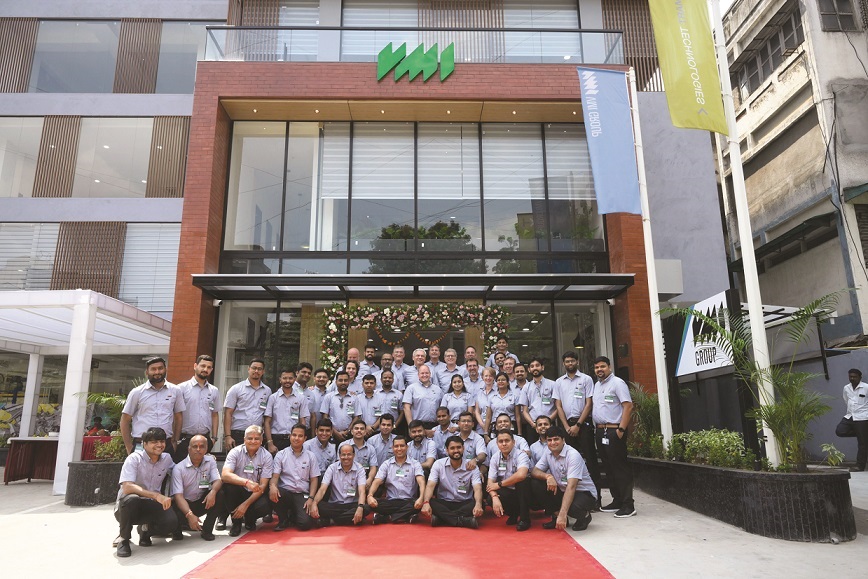
Norman said, “These are exciting times for us to expand our presence in India. We will be helping to growth the economy in a key sector while tapping into the most important pool of software expertise on earth. As the focus on smart software grows more intense in the next few years, we expect our new Indian colleagues to play a key role in growing both VMI and the Indian economy.”
Linglong Sport Master Gets Recommendable Rating By ACE Auto Club Europe
- By TT News
- February 21, 2026

The Linglong Sport Master has received a ‘recommendable’ overall rating from the ACE Auto Club Europe following a comprehensive summer tyre test. The evaluation focused on performance in the popular 225/40 R18 XL size, suitable for models like the Volkswagen Golf and Audi A3. To ensure impartiality, the tyres were purchased anonymously from retailers, and three VW Golf 8s served as the test vehicles.
The assessment was structured around three key categories: safety in wet conditions, safety in dry conditions and environmental impact, with a maximum possible score of 170 points. The wet handling segment, which carries the greatest weight in the overall ranking, was given particular emphasis due to its critical importance for everyday driving safety in challenging weather.
In this rigorous evaluation, the Linglong tyre stood out for its exceptional performance on wet roads, matching the results of the test winner in this crucial safety discipline. It also proved to be a top contender during dry handling assessments and noise level measurements. Notably, the Sport Master achieved these high safety marks while being the most affordable option in the test group, demonstrating that cost does not have to compromise quality.
The rolling resistance tests conducted in Finland further confirmed its balanced approach to economy and environment. Its performance was so strong that it earned the ACE ‘recommendable’ rating overall. The test highlights that this budget-friendly tyre delivers premium-level safety and handling without compromise. The tyre is available in over 70 sizes ranging from 16 to 22 inches.
Bridging Critical Gaps In The Tyre Industry
- By Sharad Matade & Gaurav Nandi
- February 20, 2026

The global tyre industry faces unprecedented complexity as electrification, sustainability and intelligent vehicle systems reshape demands on materials, design and performance. CenTiRe, under Professor Saied Taheri, bridges gaps between academia and industry, integrating fundamental research with real-world constraints, fostering collaborative innovation and training engineers capable of navigating the evolving landscape of tyre and mobility technology.
The Center for Tire Research (CenTiRe) is a collaborative, industry-led research consortium partnered with Virginia Tech and the University of Akron, established in 2011–12 with seed funds from the National Science Foundation (NSF). At the time, the global tyre research ecosystem was strong in individual areas like materials, testing, vehicle dynamics and manufacturing but fragmented with few environments where these pieces were brought together in a sustained, pre-competitive way.
A critical gap was the disconnect between fundamental research and the practical questions industry engineers faced. Academic work often focused on isolated phenomena, while industry research and concept development (RCD) was under pressure to deliver solutions on compressed timelines.
Foundational problems like tyre-road interaction, variability and system-level behaviour rarely received attention in ways that were both rigorous and industrially relevant. Talent development was another challenge as companies needed engineers who could navigate experiments, modelling and real-world constraints, but training pathways were siloed.
CenTiRe was created to bridge these gaps by exposing students to industry-relevant problems early and consistently.
“Since its formation, CenTiRe’s role has evolved alongside the industry,” said CenTiRe Director and Professor Saied Taheri during an exclusive interaction with Tyre Trends.
“What began as a focus on core tyre mechanics and testing has expanded to include electrification-driven challenges, intelligent tyres, data-driven methods and stronger integration with vehicle control and mobility systems. Perhaps most importantly, the centre has evolved from a research hub to a long-term collaborative platform. Its value today lies not just in technical outputs but in continuity, providing a space where companies can step back from short-term pressures, share understanding and collectively address problems no single organisation can efficiently solve alone,” he added.
Taheri’s own focus on tyre and vehicle dynamics took shape during graduate work at Clemson University and was reinforced by observing how tyres were often treated as secondary in vehicle development, despite being the primary interface with the road.
Early experience across industry and academia showed that many vehicle-level challenges cannot be fully understood without deeper understanding of the tyre itself. Industry work underscored the importance of realism, while academic work highlighted the potential of revisiting often-overlooked fundamentals.
These experiences shaped his approach to applied research, emphasising physical understanding alongside practical implementation. More than three decades in the field have reinforced his belief that the most impactful research occurs at the boundaries between disciplines, organisations and theory and practice, a perspective that continues to guide both his work and CenTiRe.
CONVERGING PRESSURES
Tyre research today is being reshaped by several major shifts occurring simultaneously rather than sequentially, creating a level of complexity that is unprecedented. Electrification, higher instantaneous torque and evolving mobility expectations are placing new and often conflicting demands on tyres.
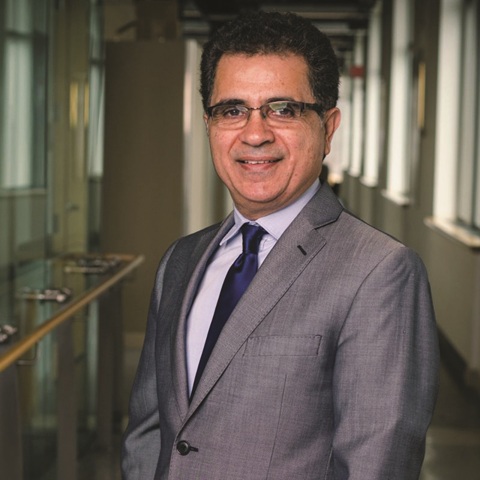 “Electric vehicles fundamentally alter the operating envelope as high torque at low speeds accelerates wear and introduces new fatigue and durability mechanisms, while increased vehicle mass raises concerns around rolling resistance, heat generation and structural integrity,” said Taheri.
“Electric vehicles fundamentally alter the operating envelope as high torque at low speeds accelerates wear and introduces new fatigue and durability mechanisms, while increased vehicle mass raises concerns around rolling resistance, heat generation and structural integrity,” said Taheri.
At the same time, customers expect quieter and more comfortable tyres, which can run counter to traditional approaches to stiffness, robustness and durability.
These challenges are compounded by the fact that tyres are increasingly expected to function as part of an integrated vehicle system, interacting closely with advanced control systems, sensors and software.
Yet, physical understanding and modelling capabilities are still catching up, particularly under transient, highly nonlinear conditions that dominate real-world operation.
Taheri adds that sustainability is another critical layer as the industry is under pressure to reduce environmental impact without compromising safety or performance, forcing a rethinking of materials, testing methods and even optimisation criteria.
From a manufacturing and testing perspective, many existing processes were developed for a very different operating regime, assuming steady-state loading, gradual wear and clearly separated performance attributes.
He also noted that next-generation tyres, especially for electrified and automated vehicles, face higher torque transients, tighter noise, vibration and harness requirements and broader duty cycles, exposing sensitivities to material variability, curing and construction that are not always measured or controlled with sufficient resolution.
“On the testing side, a widening gap exists between laboratory validation and real-world use as standardised tests remain essential, but they often fail to capture coupled thermal, mechanical, acoustic and control-related phenomena, leading to continued reliance on correlation rather than true prediction,” contended Taheri.
Shrinking development cycles further strain this system as physical testing is costly and slow, while models and surrogate tests are asked to deliver more insight without always having robust validation frameworks.
“Data analytics and machine learning are beginning to play a meaningful role in addressing some of these pressures, particularly in areas with large, well-curated datasets such as manufacturing quality monitoring and test data analysis, where they can reveal sensitivities and patterns that are otherwise difficult to detect,” noted Taheri.
However, in performance-critical domains governed by strongly nonlinear, physics-driven behaviour, these tools function best as complements rather than replacements for physical understanding.
The most promising advances are emerging from hybrid approaches that integrate physics-based models, experiments and data-driven methods.
Overall, the central challenge and opportunity is not solving any single issue in isolation but developing integrated frameworks that intelligently manage trade-offs, supported by better physics, better data and stronger cross-disciplinary collaboration.
PUSHING THROUGH OBSTACLES
Taheri has been working on tyre-road friction, terramechanics and intelligent tyres for decades and his work is cited globally. However, these areas still remain technically challenging despite decades of prior research.
Commenting on the same, he noted, “These areas remain challenging because they sit at the intersection of multiple uncertainties that are difficult to control, measure or model simultaneously. At a fundamental level, the tyre-road interface is a highly nonlinear, transient and multiscale phenomenon involving viscoelastic materials, evolving surface conditions, temperature effects and micro- to macro-scale interactions that change continuously during operation. Even small variations in road texture, contamination or load can cause disproportionately large changes in friction behaviour.”
In terramechanics, he noted, the challenge is compounded by the deformable and history-dependent nature of the road. Soil properties vary spatially and temporally and rolling fundamentally alters the medium itself, making repeatability and generalisation difficult.
Intelligent tyres add further complexity through sensing, while ensuring robustness, durability and cost-effectiveness is inherently challenging and converting those measurements into reliable, control-relevant information remains an open problem.
“Progress in materials, sensing or modelling often reveals new limitations elsewhere and as vehicle systems evolve, particularly with electrification and automation, the boundary conditions continue to shift. Consequently, these are not unsolved problems but continuously evolving ones, with each vehicle generation raising the bar for accuracy, robustness and integration,” added Taheri.
At CenTiRe, Taheri said, addressing such complexity requires integration that goes beyond organisational structure and is embedded in how research questions are framed and executed.
Problems are defined around physical phenomena or performance gaps rather than along disciplinary lines. This ensures that materials behaviour, manufacturing variability, modelling assumptions and testing constraints are considered from the outset, rather than addressed sequentially.
People, he added, are central to this approach. Students and researchers are deliberately exposed to multiple domains, while industry partners are engaged throughout the project lifecycle rather than brought in only as reviewers. This helps create a shared technical language and reduces the risk of research fragmenting into isolated silos.
“The objective is not to make everyone an expert in everything but to ensure that insights generated in one domain are meaningful, transferable and usable across the others,” Taheri noted.
NEW VISTAS
Taheri views fundamental science and industrial relevance as mutually dependent rather than competing.
“In academia, advancing understanding, especially where assumptions or models fall short, must ultimately inform design, manufacturing or validation to have real impact. At CenTiRe, this balance is achieved by deliberately selecting fundamental problems tied to real-world constraints such as manufacturing variability, testing limits and control-system needs,” he said.
Education is central to this approach as training students to think rigorously while recognising practical constraints creates a vital bridge between science and application. The balance is achieved through alignment, not compromise, by choosing problems where scientific progress and practical implementation advance together.
One area where this is particularly evident is smart and intelligent tyres. “These tyres have the potential to fundamentally change how vehicles perceive and interact with the road, though the transformation will be evolutionary rather than sudden,” noted Taheri.
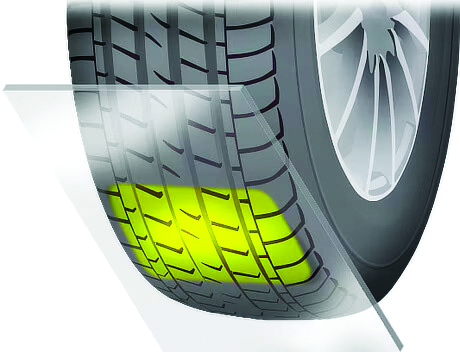 Traditionally, the tyre has been treated as a passive element in vehicle control with behaviour inferred indirectly from wheel speed, acceleration or yaw signals. Intelligent tyres allow more direct observation of the contact patch, providing real-time data on grip, load, temperature and surface conditions. This can significantly improve control robustness, especially in low-friction or rapidly changing environments.
Traditionally, the tyre has been treated as a passive element in vehicle control with behaviour inferred indirectly from wheel speed, acceleration or yaw signals. Intelligent tyres allow more direct observation of the contact patch, providing real-time data on grip, load, temperature and surface conditions. This can significantly improve control robustness, especially in low-friction or rapidly changing environments.
However, integrating tyre-level information into vehicle control introduces challenges around signal reliability, latency, validation and redundancy, particularly for safety-critical and autonomous applications.
Another key issue is abstraction as raw tyre data must be converted into physically meaningful, trustworthy indicators that can be fused with other vehicle and environmental sensors.
In autonomous driving, intelligent tyres may not act as primary perception sensors, but they can play a critical supporting role by informing systems what is actually achievable at the tyre-road interface, rather than what is assumed.
“Ultimately, this represents a shift from tyres as passive components to active contributors to vehicle intelligence, requiring advances not only in sensing but also in modelling, validation and system-level integration,” said Taheri.
TRUSTED COLLABORATION
Tyre development today faces the formidable challenge of reconciling performance, safety and environmental responsibility across the entire lifecycle. Materials that deliver wet grip, durability and fatigue resistance often carry significant environmental footprints, and replacing them without introducing new risks is technically difficult.
At the same time, improving rolling resistance to enhance energy efficiency, particularly for electric vehicles, can conflict with wear, noise and grip, while higher vehicle mass and torque further complicate trade-offs.
Wear and abrasion present another concern as tyre particles are increasingly recognised as an environmental issue, yet understanding of their generation and transport mechanisms remains incomplete.
End-of-life considerations amplify these challenges, since tyres were not historically designed for disassembly or reuse, making recycling and circularity systemic design problems. Addressing these issues requires lifecycle-based thinking, advanced predictive tools and close integration of materials, manufacturing and vehicle disciplines.
Alluding to these, Taheri noted, “CenTiRe addresses these complexities through a pre-competitive collaborative model that brings together global tyre and automotive companies in a neutral, trust-based framework. By focusing on fundamentals, the centre creates shared understanding while allowing individual companies to retain proprietary advantages in design and implementation. Its role is to reduce upstream uncertainty and risk, providing rigorous, unbiased validation that benefits all members.”
Industry continues to invest in this model because the technical challenges of electrification, system integration and sustainability are too complex and costly to tackle in isolation. Beyond technical outputs, the consortium fosters a shared language, trust and a culture of collaboration that enables competitors to learn from each other without compromising competitiveness.
Looking ahead, the hope is that Taheri and CenTiRe are recognised less as a single person or centre and more as a trusted ecosystem that helped the tyre and mobility industry think more rigorously and collaboratively about tyre performance, safety and sustainability.
“Success will be measured by the engineers trained to bridge physics and manufacturing realities, the risk de-risked through sound modelling and experimentation and the elevated global technical conversation around tyres,” said Taheri.
Equally important is the role of CenTiRe in building bridges between disciplines, companies and generations of engineers, helping the industry better understand and respect one of the most complex yet underappreciated components of mobility.
Over the next decade, this vision positions CenTiRe as both a technical and cultural catalyst for the global tyre and mobility sector. n
Continental Achieves Top Ratings In CDP Climate And Water Security Ranking
- By TT News
- February 20, 2026

Continental has once again received recognition from the CDP for its transparent and proactive approach to environmental stewardship, securing an ‘A-‘ rating for climate action and supply chain management. Formerly known as the Carbon Disclosure Project, this independent non-profit evaluates corporate environmental impact using a rigorous scoring system that ranges from ‘A’ for leadership to ‘D’ for initial disclosure. Continental’s latest score reflects its strong performance in reducing CO₂ emissions, advancing low-carbon innovation and promoting sustainability across its supplier network. The company also maintained a ‘B’ rating in water management for the second year in a row, underscoring its consistent efforts in this area.
For over 15 years, Continental has taken part in CDP assessments, which help investors and other stakeholders gauge how effectively companies are addressing environmental challenges. In the climate category, CDP considers factors such as emissions reduction initiatives, environmental policies and the influence a company exerts on its suppliers’ sustainability practices. Continental’s rating affirms its commitment in each of these areas.


A cornerstone of the company’s climate strategy is its participation in the RE100 initiative, through which it has sourced green electricity since 2020. This includes power generated from on-site solar installations as well as electricity procured through regional and grid-wide power purchase agreements. These contracts not only ensure a steady supply of renewable energy and price stability but also contribute to the expansion of new wind and solar projects. Together, these efforts help reduce Scope 2 emissions. Further energy savings are achieved through efficiency upgrades such as better insulation of production equipment, LED lighting retrofits and systematic leak detection and repair.
In water management, Continental has made significant progress by reducing water withdrawal per metric tonne of product by more than 10 percent between 2020 and 2025. This reduction, equivalent to 197 million litres, was accomplished through measures like water reuse, treatment and more efficient usage across its facilities.

The company also prioritises traceability and transparency in its raw material supply chains. It enforces strict sourcing standards, engages directly with local producers – for instance, by training smallholder farmers in sustainable natural rubber cultivation – and employs digital tools to monitor and improve supply chain integrity. Additionally, Continental invests in alternative materials to lessen its environmental footprint. These include silica derived from rice husk ash, tall oil from paper production and polyester fibres made from recycled PET bottles collected in regions lacking bottle deposit systems.
Jorge Almeida, Head of Sustainability, Continental Tires, said, “We constantly optimise production, products and processes through all phases of a tyre’s life cycle – from raw-material sourcing and manufacturing to use and end-of-life management. We are committed to climate action in our own operations and through close collaboration with our suppliers.”
Tolins Tyres Reports Higher Quarterly Revenue As Volumes Recover
- By Sharad Matade
- February 20, 2026

Tolins Tyres Limited reported a rise in quarterly revenue as demand recovered across retreading materials and new tyre segments.
Revenue for the three months to 31 December 2025 increased 33.8 percent year on year to INR 933 million, while earnings before interest, tax, depreciation and amortisation (EBITDA) rose to INR 142 million. Net profit declined to INR 105 million from INR 109 million a year earlier.
For the first nine months of the financial year, revenue rose 11.8 percent to INR 2.49bn. EBITDA fell to INR 366 million from INR 426 million, and net profit declined to INR 268 million from INR 294 million.
Tolins Tyres said growth in the quarter was supported by higher volumes in domestic markets and increased contribution from recently launched agricultural tyres. The India business remained the main source of revenue, while UAE operations contributed steadily.
Dr K V Tolin, promoter, chairman and managing director of Tolins Tyres Limited, said, “Q3 FY26 marked a strong rebound in performance with robust year-on-year revenue growth and clear recovery in volumes across both retread and new tyre segments. The deferred demand witnessed in Q2 has meaningfully converted into orders during the quarter, reflecting improved customer sentiment and normalized buying patterns following the GST revision.
The agricultural segment delivered encouraging traction, with our newly launched tractor rear tyre range beginning to contribute meaningfully to revenues. The increasing share of tractor tyres in our overall mix validates our strategic focus on expanding presence in high-demand farm tyre categories. Distribution expansion and deeper engagement with institutional customers further supported volume growth across key markets.
For the nine-month period, the Company has demonstrated resilience and improved operational momentum. With demand visibility strengthening, a diversified customer base, and continued cost discipline, we believe Tolins Tyres is well-positioned to sustain growth in the coming quarters while maintaining focus on margin stability and operational efficiency.”







Comments (0)
ADD COMMENT